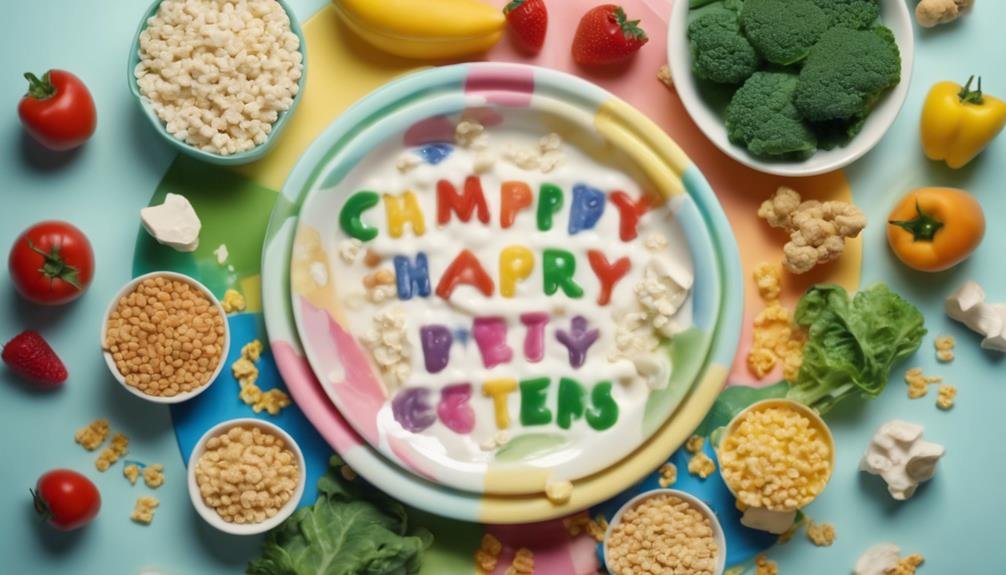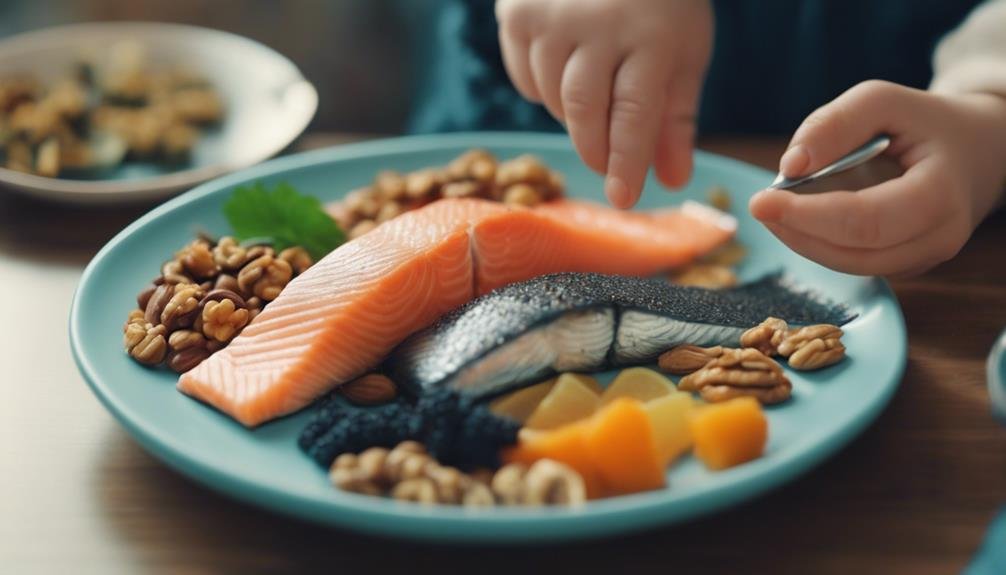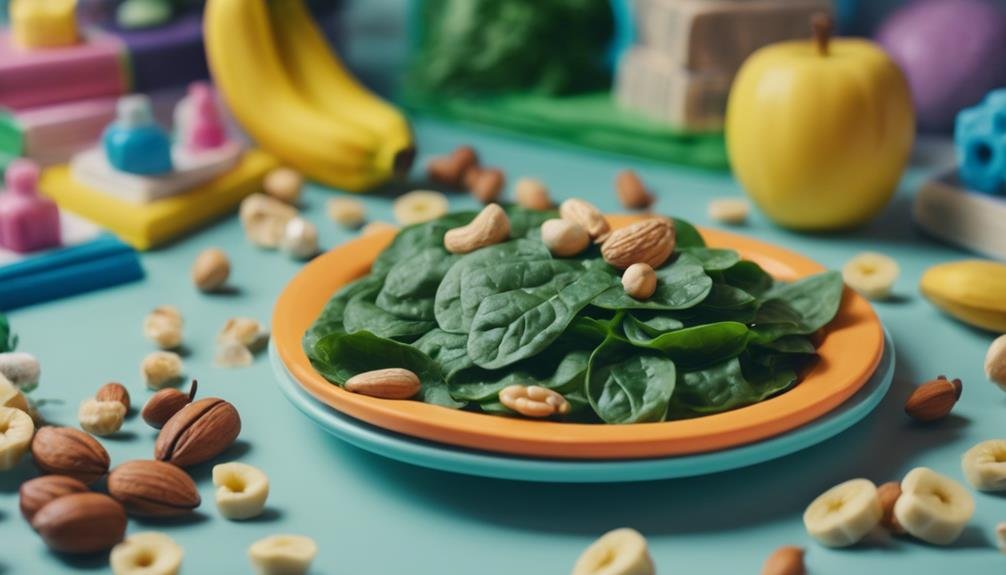"Cherishing Little Steps - A Haven for Baby and Family Journeys"
Essential Vitamins and Minerals for Toddler Growth and Development
You know your toddler's growth and development are top priorities. Ensuring they receive essential vitamins and minerals is key to supporting their overall well-being. From Vitamin A to Omega-3 fatty acids, each nutrient plays a crucial role in different aspects of your child's health. But have you considered the specific benefits of these vital nutrients and how they contribute to your toddler's growth and development? Let's explore the importance of each nutrient and how you can incorporate them into your toddler's diet for optimal health and well-being.
Key Takeaways
- Vitamin A supports vision and immunity, essential for growth.
- Vitamin D crucial for bone health, immunity, and mood balance.
- Vitamin C aids in immune function, wound healing, and collagen formation.
- B complex vitamins convert food to energy, support brain function.
- Zinc supports immune function, taste perception, and cognitive abilities.
Importance of Vitamin A

When supporting your toddler's growth, ensuring they receive adequate Vitamin A is crucial for their overall health and development. Vitamin A plays a vital role in various bodily functions, such as maintaining healthy vision, supporting immune system function, and promoting cell growth.
Without enough Vitamin A, your toddler may experience issues with their eyesight, making it difficult for them to see clearly, especially in low light. Additionally, Vitamin A helps the body fight off infections, keeping your little one healthy and strong.
Including Vitamin A-rich foods in your toddler's diet is essential. Foods like sweet potatoes, carrots, spinach, and dairy products are excellent sources of this important vitamin. By offering a variety of these foods regularly, you can help ensure that your toddler is getting enough Vitamin A to support their growth and development.
Benefits of Vitamin D
Ensuring your toddler receives adequate Vitamin D is essential for supporting their overall growth and development. Vitamin D plays a crucial role in bone health by helping the body absorb calcium and phosphorus, necessary for strong bones and teeth. Additionally, this vitamin supports the immune system, reducing the risk of infections and autoimmune diseases.
Sunlight is a primary source of Vitamin D, but it can also be found in foods like fatty fish, fortified dairy products, and egg yolks. However, many toddlers may not get enough Vitamin D through diet alone, making supplementation important.
Adequate Vitamin D levels have been linked to a reduced risk of chronic diseases later in life, such as heart disease, diabetes, and certain cancers. Moreover, this vitamin is essential for proper muscle function and can contribute to a balanced mood and overall well-being in your little one. Prioritizing Vitamin D intake for your toddler is a simple yet impactful way to support their health and development.
Role of Vitamin C

Curious about how Vitamin C benefits your toddler's growth and well-being? Vitamin C plays a crucial role in supporting your little one's development in various ways. This essential vitamin helps in the absorption of iron, aids in the formation of collagen for healthy skin, bones, and connective tissues, and boosts the immune system to fight off infections.
As a powerful antioxidant, Vitamin C also assists in protecting your toddler's cells from damage caused by free radicals. This can contribute to overall health and well-being, helping your child thrive and grow. Additionally, Vitamin C supports the body in healing wounds and maintaining healthy teeth and gums.
Including Vitamin C-rich foods in your toddler's diet, such as oranges, strawberries, kiwi, and bell peppers, can ensure they receive an adequate amount of this vital nutrient. Remember, a balanced diet with a variety of fruits and vegetables is key to providing your toddler with the necessary nutrients for optimal growth and development.
Significance of Iron
To support your toddler's growth and development, iron plays a crucial role in maintaining overall health and well-being. Iron is essential as it helps in the formation of hemoglobin, the protein in red blood cells that carries oxygen to all parts of the body. Without enough iron, your toddler may experience fatigue, weakness, and difficulty concentrating. Iron is particularly crucial during periods of rapid growth, such as infancy and toddlerhood, to support brain development and overall physical health.
Ensuring your toddler gets enough iron can be achieved through a balanced diet that includes iron-rich foods such as lean meats, poultry, fish, beans, fortified cereals, and leafy green vegetables. If needed, iron supplements may be recommended by your healthcare provider, especially for picky eaters or those with specific dietary restrictions.
Keep in mind that too much iron can also be harmful, so always consult with your healthcare provider before giving your toddler any supplements. By prioritizing iron-rich foods in your toddler's diet, you're actively supporting their growth, development, and overall well-being.
Impact of Calcium

Maintaining adequate calcium levels is crucial for supporting your toddler's bone development and overall growth. Calcium plays a vital role in ensuring strong bones and teeth, as well as supporting muscle function and nerve signaling.
Here are three key reasons why calcium is essential for your little one's health:
- Bone Development: Calcium is a building block for bones, helping them grow strong and healthy during the crucial early years of your toddler's life.
- Teeth Health: Calcium is also important for dental health, contributing to the development of strong teeth and preventing dental issues later on.
- Muscle Function: Calcium is involved in muscle contractions, including the beating of the heart, making it essential for overall muscle function and movement.
Ensuring your toddler gets enough calcium through a balanced diet that includes dairy products, leafy greens, and fortified foods is key to supporting their growth and development. Remember, every bit of calcium counts in nurturing your child's health and well-being.
Power of Zinc
As your toddler's growth continues, exploring the importance of Zinc in their diet can provide valuable insights into supporting their overall health and development. Zinc plays a crucial role in various aspects of your child's growth, such as immune function, wound healing, and even taste perception. This essential mineral is involved in the production of enzymes that aid in digestion and metabolism, ensuring your little one can effectively absorb nutrients from their food.
Moreover, Zinc is vital for the proper functioning of your toddler's immune system, helping to fight off infections and keeping them healthy. It also contributes to the development of cognitive abilities, making it essential for their learning and memory as they grow. Ensuring an adequate intake of Zinc through a balanced diet is key to promoting optimal growth and development in your toddler. Foods like meat, legumes, nuts, and dairy products are good sources of Zinc that can easily be incorporated into their daily meals to support their overall well-being.
Essential Omega-3 Fatty Acids

Ensuring your toddler receives an adequate intake of essential Omega-3 fatty acids is crucial for supporting their overall growth and development. Omega-3 fatty acids play a vital role in brain development, immune function, and eye health.
Here are three key benefits of Omega-3 for your little one:
- Brain Development: Omega-3 fatty acids, particularly DHA, are essential for the growth and development of your toddler's brain. They help support cognitive function and may even enhance learning abilities.
- Immune Function: Omega-3s have anti-inflammatory properties that can help boost your toddler's immune system. By including these fats in their diet, you may reduce the risk of common illnesses.
- Eye Health: DHA, a type of Omega-3, is a major structural component of the retina. Adequate intake of DHA can support good vision development in toddlers.
Vitamin B Complex
To further support your toddler's growth and development, let's now explore the importance of incorporating Vitamin B Complex into their diet. Vitamin B Complex consists of eight essential B vitamins that play a crucial role in your child's overall health. These vitamins help convert food into energy, support brain function, and aid in the production of red blood cells.
Thiamine (B1), Riboflavin (B2), Niacin (B3), Pantothenic Acid (B5), Pyridoxine (B6), Biotin (B7), Folate (B9), and Cobalamin (B12) are all part of the Vitamin B Complex family. These vitamins are found in various foods such as whole grains, dairy products, meat, eggs, and leafy greens.
Ensuring your toddler receives an adequate amount of Vitamin B Complex is essential for their growth, energy levels, and cognitive development. If your child has a balanced diet with foods rich in these vitamins, they're likely to meet their daily requirements. However, if you have concerns about their vitamin intake, consulting a healthcare provider can provide personalized recommendations.
Magnesium for Toddler Growth

Incorporate magnesium into your toddler's diet to support their growth and development effectively. Magnesium is a crucial mineral that plays a vital role in various bodily functions, especially during the rapid growth and development stages of toddlerhood.
Here are three essential reasons why magnesium is beneficial for your toddler's growth:
- Bone Development: Magnesium is essential for the formation of healthy bones and teeth in growing toddlers. It works in conjunction with other minerals like calcium and vitamin D to ensure proper bone mineralization.
- Muscle Function: Magnesium helps regulate muscle function and nerve impulses, supporting your toddler's motor skills development and overall muscle health.
- Energy Production: This mineral is involved in energy production at the cellular level, which is crucial for active toddlers who are constantly on the move.
Ensuring an adequate intake of magnesium through a balanced diet can contribute significantly to your toddler's overall growth, development, and well-being. Consider including magnesium-rich foods like nuts, seeds, whole grains, and leafy green vegetables in your toddler's meals to support their optimal growth.
Frequently Asked Questions
Can Toddlers Get Enough Vitamin D From Sunlight Alone?
You can't rely solely on sunlight for enough Vitamin D for toddlers. While sun exposure is beneficial, diet and supplements are necessary for adequate intake. Talk to a healthcare provider to ensure your child's needs are met.
How Can I Ensure My Toddler Gets Enough Zinc in Their Diet?
To ensure your toddler gets enough zinc in their diet, incorporate foods like lean meats, beans, nuts, and dairy products. These options provide essential zinc for your little one's growth and development needs.
Is There a Difference Between Heme and Non-Heme Iron Sources?
Like a compass guiding you, understanding the difference between heme and non-heme iron sources can help you make informed choices for your health. Heme iron comes from animal sources, while non-heme is plant-based.
Are Omega-3 Supplements Necessary for Toddler Growth?
You might wonder if omega-3 supplements are necessary for toddler growth. They can be beneficial for brain development and overall health. Consult with your pediatrician to determine if they are needed for your child's diet.
What Are Some Common Signs of Magnesium Deficiency in Toddlers?
When you wonder about common signs of magnesium deficiency in toddlers, keep an eye out for muscle twitches, fatigue, and poor appetite. Remember, the body speaks its own language, so pay attention.
Conclusion
You've learned about the essential vitamins and minerals crucial for your toddler's growth and development.
Imagine little Emily, who used to struggle with frequent colds and weak bones. After incorporating a balanced diet rich in Vitamin C, Vitamin D, and calcium, Emily now enjoys a healthier immune system and stronger bones.
By ensuring your child gets these vital nutrients, you can support their optimal growth, development, and overall well-being.
Keep up the good work, parents!



The Basic Principles Of buy injectable steroids. https://24by7directory.com/listings12691558/the-basic-principles-of-buy-injectable-steroids
child porn
Wow, superb blog structure! How long have you ever been running a blog for?
you made blogging glance easy. The entire look of your
site is wonderful, as well as the content material!
You can see similar here dobry sklep